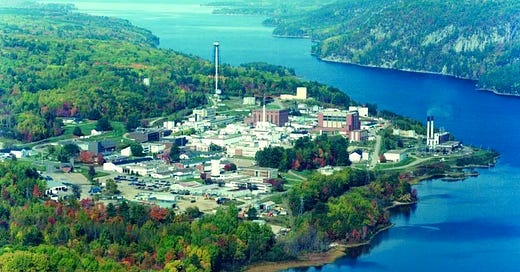The Day a Future President Saved Canada from Nuclear Disaster - Jill
As you read this, I will be underwater in the shadow of the Canadian Nuclear Labs at Chalk River, Ontario. A permitted near-surface nuclear disposal site has a lot of people concerned about potential impacts on the flora and fauna of the Kitche Zibi Ottawa River. Alongside Indigenous Elders from the Kebaowek First Nations, my colleagues and I aim to capture a comprehensive picture of the native and endangered species in the region. The leadership of the Kebaowek First Nations is crucial as they have a deep understanding of the local ecosystem with insights that are invaluable in conservation efforts. We’ll be surveying the mussel population in the vicinity of Oiseau Rock, a sacred site that rises 150 meters to tower over the river.
If the name Chalk River rings a bell, it’s because this site is home to a remarkable story—one where a future U.S. president helped avert a catastrophe. In 1952, just 180 kilometres northwest of our Canadian capital, the world witnessed its first nuclear meltdown at the Chalk River reactor. This reactor, a significant part of nuclear history, was a pioneering facility in the development of nuclear energy. While incidents like Chornobyl, Fukushima, and Three Mile Island are well-known, few remember the heroic efforts that prevented disaster here.
On a Tuesday in December 1952, mechanical failures and operator errors led to overheating in the fuel rods, causing severe damage to the reactor core. The partial meltdown triggered explosions and flooding, with thousands of gallons of water inundating the facility. Canada turned to its southern neighbour for help. At the time, Jimmy Carter, a U.S. Navy lieutenant working on a nuclear submarine project in Schenectady, New York, was called upon to lead a team to the remote site on the Ottawa River. Their mission was to shut down the reactor, dismantle it, and repair it.
Carter’s approach was meticulous. He and his team constructed a reactor replica in a local playground, practicing demolition and repairs repeatedly until they had perfected the process. When the time came to work on the actual reactor, each team member was given just 90 seconds inside to minimize their exposure to dangerous radiation. For Carter, this meant being lowered into the reactor, turning a bolt with a wrench, and being hoisted back out—over and over again. By today’s safety standards, this mission would never have been approved. The men knew they were taking immense risks, but they were driven by the need to prevent a far greater disaster. They were even warned that if they survived, they might never be able to have children.
As the team worked, they simultaneously replicated each step on the playground model, ensuring everyone knew precisely what to do next. Their efforts paid off. The situation stabilized, but the men in Carter’s team continued to have radioactive urine for many weeks. Today, at 99 years of age, former President Carter can look back on his gallant service in the military and enjoy his four children, 22 grandchildren, and dozens of great-grandchildren
A quick pic on the Ottawa River near the nuclear lab. Not much cellular service here!
As for me, I will be thinking about the leadership and sacrifice of Jimmy Carter during my dives. I hope I don’t find any glowing mussels.
We subscribe to Canadian Geographic magazine and you should too. This month’s issue came in this morning and surprise! - A woman explorer you may know is featured on the inside back cover. Please support CanGeo’s educational efforts: RCGS.org/member
Physical Media - Robert
OK. I’ll admit it. I am a Boomer and think Spotify, Apple Music, Amazon, Soundcloud, and every other music streaming service I’ve tried are simply: TERRIBLE. I really tried to like them. I was an early adopter of several streamers including MP3.com, GrooveShark and Pandora. I even file shared via Limewire and Napster. (At least they tried…). However, modern algorithm-driven music delivery is so dumbed down and vanilla that I have given up trying to make it work for me. (I’m a guy who once mixed monitors with The Clash, so our definition of “Vanilla” may vary).
Here’s an Americana Music playlist I put together on Spotify.
Here are some “physical” CDs that I found at a local flea market. I was in the mood for some women singer/songwriters.
Do you remember what it was like to hold a record or CD in your hands? To open the cellophane wrapper for the first time and experience the smell and feel of a brand new album? To carefully slide the disc out of the sleeve and place it on your player? To read the liner notes - even down to the assistant sound engineer? To follow along with the printed lyrics on your lap? And if especially fortunate, you discover the wall poster hidden inside? Oh, the fond memories I have of physical recorded media!
PRESS PLAY below and see if it brings back fond memories for you as well.
WE ARE TAKING SOME TIME AWAY AND THE NEXT NEWSLETTER MAY NOT BE PUBLISHED UNTIL THE END OF AUGUST. THANK YOU FOR YOUR CONTINUED ENGAGEMENT AND SUPPORT. CHEERS - Jill and Robert









Interesting article! I always thought that Jimmy Carter was an unsung hero for many reasons but here is another one! I have been exposed to Chernobyl radiation as a child and always dealing with the aftermath, I am certainly not a fan of them! Enjoy your time off!